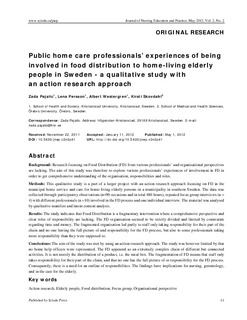| dc.description.abstract | Background:
Research focusing on Food Distribution (FD) from various professionals’ and organisational perspectivesare lacking. The aim of this study was therefore to explore various professionals’ experiences of involvement in FD inorder to get comprehensive understanding of the organisation, responsibilities and roles.
Methods:
This qualitative study is a part of a larger project with an action research approach focusing on FD in themunicipal home service and care for home-living elderly persons in a municipality in southern Sweden. The data wascollected through participatory observations (n=90 occasions and in total 480 hours), repeated focus group interviews (n =4) with different professionals (n =10) involved in the FD process and one individual interview. The material was analysedby qualitative manifest and latent content analysis.
Results:
The study indicates that Food Distribution is a fragmentary intervention where a comprehensive perspective andclear roles of responsibility are lacking. The FD organisation seemed to be strictly divided and limited by constraintsregarding time and money. The fragmented organisation led partly to staff only taking responsibility for their part of thechain and no one having the full picture of and responsibility for the FD process, but also to some professionals takingmore responsibility than they were supposed to.
Conclusions:
The aim of the study was met by using an action research approach. The study was however limited by thatno home help officers were represented. The FD appeared as an extremely complex chain of different but connectedactivities. It is not merely the distribution of a product, i.e. the meal box. The fragmentation of FD means that staff onlytakes responsibility for their part of the chain, and that no one has the full picture of or responsibility for the FD process.Consequently, there is a need for an outline of responsibilities. The findings have implications for nursing, gerontology,and in the care for the elderly. | nb_NO |

